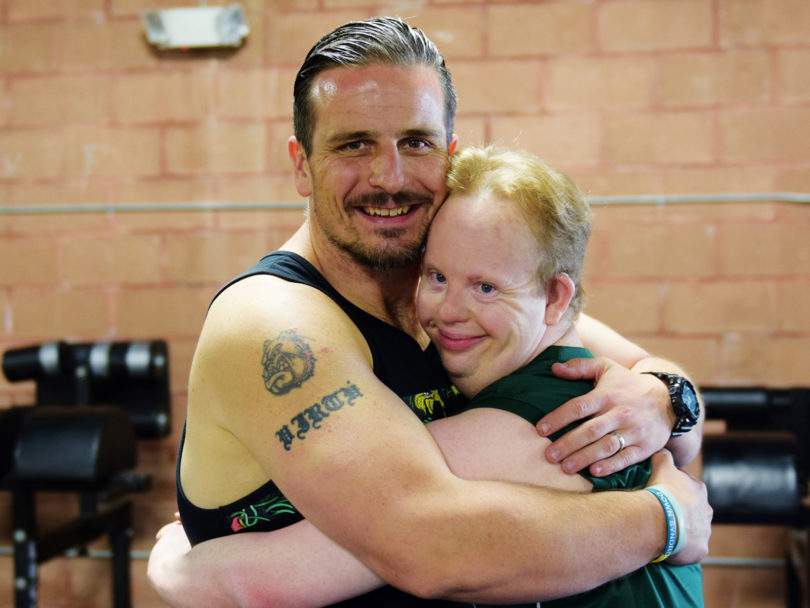The man who approached David Marmon in a Farm Fresh parking lot a few months back was just taking a stab at finding help for his adult son, who has Down syndrome.
Marmon’s truck sported the name of his Williamsburg-based fitness training center, Marmon Muscle. Doug Rohde was searching for a personal trainer to work with his son Jason, 36, who had fallen out of shape, placing him at risk for further health complications. The gyms that Rohde had already visited were either too expensive or, in his opinion, not sensitive enough to Jason’s needs.
Rohde asked if Marmon could recommend a trainer.
“Well, you’re not going to believe this,” Marmon responded.
Turns out, Marmon has a 4-year-old daughter with Down syndrome. He and his wife, Britta, had watched their little girl, Maddox, mimic the exercises she saw people doing at their gym. The couple had begun to discuss how they might open up training to adults and children with the disorder.
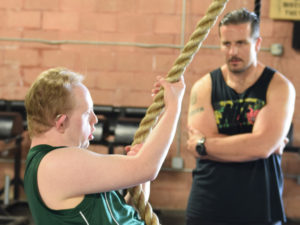 “I was thrilled. Here was my first client,” Marmon recalls. “I have always wanted to keep the bar superhigh for my daughter, to push her so she can rise to her potential. So I understood exactly what Doug wanted from me.”
“I was thrilled. Here was my first client,” Marmon recalls. “I have always wanted to keep the bar superhigh for my daughter, to push her so she can rise to her potential. So I understood exactly what Doug wanted from me.”
For the past two months, Jason Rohde has trained at Marmon Muscle for one hour three times a week. He started out quiet, shy and reluctant to make eye contact. He balked at attempting many new exercises, from running sprints to pushing tires, fearing he would fall or otherwise fail. Trainers had to hold his hand whenever he jumped.
Not anymore. Today, he challenges Marmon and his assistant coach, Audra Harrison, to speed and strength contests–not to mention dance-offs. Ask him what he likes best and he says, “Exercise and talking to people.” And which type of exercise is his favorite? “All of it,” he replies.
Rohde and his wife, Irma, already see more confidence in their son. “He’s stronger. He stands up straighter. He loves it there because they get him and they treat him with respect. They know he can do anything, even if it might take him a little longer than some other people.”
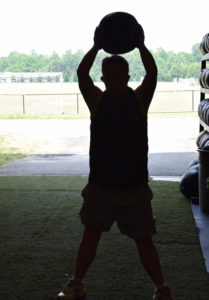 Working with Jason has confirmed what Marmon sees in his daughter, Maddox: That she is a sponge, ready to learn and grow, and should never be treated like a baby.
Working with Jason has confirmed what Marmon sees in his daughter, Maddox: That she is a sponge, ready to learn and grow, and should never be treated like a baby.
It’s important to make people with Down syndrome feel comfortable and safe, yes, but it’s also important to be hard on them,” he says.
Down syndrome is a genetic, chromosomal disorder that affects about one in 700 babies born in the United States, according to statistics from the Centers for Disease Control and Prevention. Individuals with the disorder experience developmental and intellectual delays to varying degrees; common physical traits include low muscle tone and small stature. They also have a higher risk of congenital heart defects, respiratory problems, obesity and Alzheimer’s disease, although new treatments have raised average life expectancy from 25 in 1983 to 60 today, according to the National Down Syndrome Society.
David and his wife didn’t know their first child was affected until she was born. “She was having trouble breathing, so they rushed her away,” recalls Marmon, 38. “When the doctor came back, you could clearly see the concerned look. He said, ‘She has a collapsed lung and multiple holes in her heart, and we think she may have features of Down syndrome.’ You go from the top of the world to thinking, ‘What will this mean for my child? Will she be able to communicate? Wait, is she even going to live?’ There’s this mourning phase of something you’ve lost.”
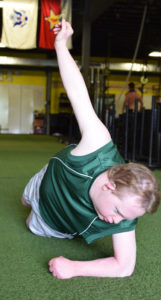 That mourning phase didn’t last long. Maddox proved to be a fighter during her 10 days at Children’s Hospital of the King’s Daughters in Norfolk, Va., where she spent time in an incubator and was gradually weaned off a breathing tube. The holes in her heart healed without surgery.
That mourning phase didn’t last long. Maddox proved to be a fighter during her 10 days at Children’s Hospital of the King’s Daughters in Norfolk, Va., where she spent time in an incubator and was gradually weaned off a breathing tube. The holes in her heart healed without surgery.
These days, Maddox is small for her age and a little behind on vocabulary and potty training. Despite that, she’s in an inclusive preschool, takes gymnastics classes and plays with friends with and without special needs, as well as her baby brother Bo, who is almost 2 years old. “We’re going one day at a time, but pretty much I just feel like I have a 4-and-a-half-year old,” Marmon says.
As a lifelong athlete, Marmon knew exercise would benefit Maddox, just like it does everyone else. A former football player and wrestler, the the Alabama-raised, Auburn University graduate was a conditioning coach at the College of William & Mary–where wife Britta was assistant women’s soccer coach– before he became owner, president and head coach at Marmon Muscle in 2010. His wife is co-owner, vice president and assistant coach.
Their center is the home of CrossFit Williamsburg and offers a variety of fitness programs, including personal and team training, weightlifting and online consultations for coaches and athletes. Like many of the company’s eight coaches, Marmon also competes in CrossFit, a high-intensity workout that incorporates elements from several sports and exercise routines.
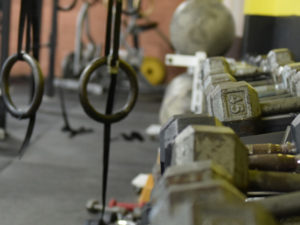 “I like being able to always test myself and see how I can keep improving, even as I get older,” he explains. “I still get butterflies and goosebumps before competitions.”
“I like being able to always test myself and see how I can keep improving, even as I get older,” he explains. “I still get butterflies and goosebumps before competitions.”
Eventually, the Marmons would like to train more individuals with special needs, perhaps by setting up a nonprofit foundation. They plan to move slowly, however, because they recognize that the one-on-one time they can devote to clients like Jason has been vital.
You’ve got to develop trust,” Marmon says. “It has to be a fun, positive experience. We want this to be the best hour of Jason’s day.”
Trainers also are working with Jason on proper nutrition, positive self-talk, making eye contact and speaking clearly, memorizing warm-up routines and setting up and putting away equipment without prompting. He adds: “This is about his entire life.”
Although Jason has a second-degree green belt in karate and Special Olympics medals in swimming and track, he had become too sedentary in recent years. The gym has added an important element to his life, which includes a girlfriend, a weekly allowance for doing chores at home, activities at Colonial Behavioral Health and the Arc of Greater Williamsburg, church service projects and time spent listening to music, singing, dancing and coloring.
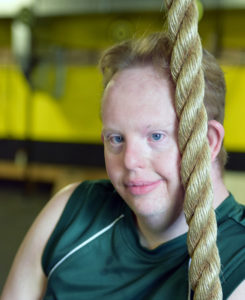 “I am watching my son change,” Rohde says. “And it’s all because I walked up to the right guy at the grocery store.”
“I am watching my son change,” Rohde says. “And it’s all because I walked up to the right guy at the grocery store.”

